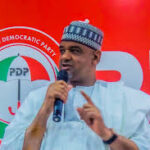Here is a nation in a representative democratic system and with abundant human and natural resources but ironically continuously perceiving the terrifying miasma of hopelessness. And this is apparently courtesy of decades of political leadership insincerity and a consistently naive populace that constitute the electorate.
Nigeria’s politicians have unrepentantly remained steadfast in their respective bids to grapple power through every means simply to rule and please themselves just as the nation’s electorate, unaware of their powers of deciding not only who gets power but also how the public treasury is administered, have remained notoriously reckless at every election cycle.
And in the present circumstance, government has become an enterprise for the politicians where they invest during elections by simply buying the conscience and therefore votes of the electorate. The outcome of all this is that the common man is deprived access to affordable quality education, healthcare service and housing, and lack of security of life and property.
It is therefore right to note at this instance that the thorough recklessness Nigerians demonstrated at the polls in the intervals of four years since 1999 gave birth to the untold hardship the nation is experiencing as well as the hopelessness that accompanies it.
- Protest allegation: Obi demands N5bn, apology from Onanuga
- $250,000 meant for VVF treatment used to train doctors – Women affairs minister
The nation is in so much uncertainty. And given recent happenings, Nigeria may have woken up from the slumber that characterised its people since 1999. Nigerians are not only disturbed by the state of affairs in the country; they have also begun making concerted efforts at finding solutions; thus, the idea of staging a nationwide protest against the hunger, anger and pain that characterise the country’s atmosphere.
With the August 1 scheduled date of the nationwide protest inching nearer, it is not yet clear as to whether or not it will get the widespread acceptance and participation it requires to make the impact the organisers anticipate.
Past events have shown that protest may not be a reliable tool to express dissatisfaction on the way things are done in Nigeria. This owes to the religious and cultural differences that exist between the people. The EndSARS protest, which occurred in October, 2020 is a pointer. Participation was largely in the southern part of the country. In the north, it was negligible and did not attract much attention.
And while pundits argued that the north did not participate fully in the protest because the defunct SARS unit of the Nigeria Police was not as terrific in the region as it was in the south, it is also essential to put into consideration the religious and cultural factors in the north that dislike rebelling against leadership. And protest, as much as it is a tool of expressing dissatisfaction to the leadership of a people on the way things are done, it is also a way of rebelling against it. However, time will tell how
Muktar Jarmajo can be reached via [email protected]
 Join Daily Trust WhatsApp Community For Quick Access To News and Happenings Around You.
Join Daily Trust WhatsApp Community For Quick Access To News and Happenings Around You.

